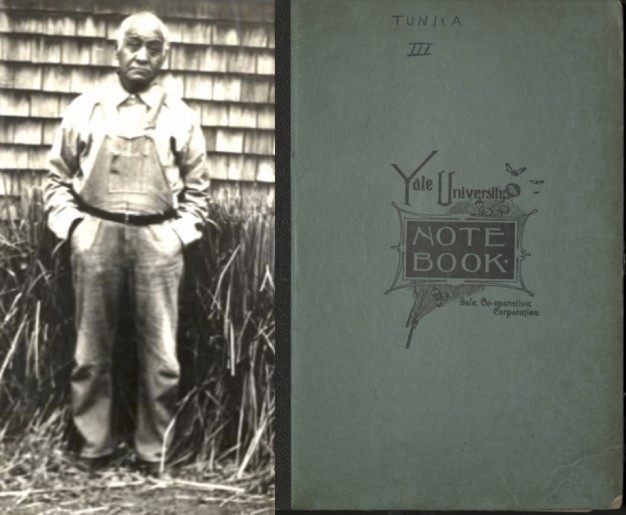CNAIR awarded grant to develop digital linguistic resource with Tunica-Biloxi Tribe of Louisiana
The American Philosophical Society (APS) is pleased to announce a new $200,000 grant it has received from the National Science Foundation’s Dynamic Language Infrastructure program.
As part of this two-year project, the Center for Native American and Indigenous Research (CNAIR) at the APS’s Library & Museum is deeply honored to be able to partner with the Tunica-Biloxi Tribe of Louisiana and its Language and Cultural Revitalization Program in the development of a new Indigenous Language Manuscripts Interface (ILMI).
At the core of the project is a set of 14 notebooks containing over 2,000 handwritten pages of Tunica stories, language information, and cultural knowledge recorded by the linguist Mary R. Haas in the 1930s with Sesostrie Youchigant, the last known fluent speaker of Tunica. These notebooks, which are fully digitized and accessible in the APS Digital Library, will be transcribed, transliterated into the contemporary Tunica writing system, analyzed, and be given broader commentaries and context by a team of the Tribe’s language apprentices, language experts, and linguists affiliated with the Tunica Language Project (TLP). The lead linguist on the project is long-time TLP participant Patricia Anderson, author of Revitalization Lexicography: The Making of the New Tunica Dictionary (U of Arizona Press, 2020).

The final product will be a comprehensive online resource allowing a wide variety of audiences to explore the notebooks through fully searchable text and navigational tools. It will also include a downloadable open data set of the full transcriptions with extensive analysis for use by linguists studying Tunica, which has highly distinctive characteristics among the world's languages. For example, it is one of the few languages in the world in which feminine gender is the default gender.
In addition, the transformation of the valuable language information in these notebooks from manuscript to digital form will serve as the pilot case around which the APS will develop its new Indigenous Language Manuscripts Interface (ILMI). This digital platform will allow people to more easily navigate digitized linguistic manuscripts in the APS Digital Library through enhanced tools such as clickable tables of contents and searchable transcriptions that can be viewed side-by-side with their corresponding original pages.

This new resource will greatly enhance not just the accessibility, but the usability of digitized Indigenous language manuscripts overall at the APS, as it will be adaptable to any digitized linguistic materials in the APS collections appropriate for general public access in the Digital Library. In this way, the project seeks to open up new possibilities for collaboration in Indigenous community-led language revitalization efforts by showing new ways that archives can actively contribute to the creation of new resources centered around archival materials.
For more about the importance of these notebooks in the revitalization of the Tunica language, as part of the APS's Fall 2020 conference, Elisabeth Pierite-Mora of the Tunica-Biloxi Tribe’s Language and Cultural Revitalization Program, and Patricia Anderson of the Tunica Language Project, gave a presentation on the importance of these notebooks within the history of the Tribe’s language revitalization efforts. Learn more about this event, how to register for this free online symposium, and view recorded talks after the conference by visiting the conference website: Relationships, Reciprocity, and Responsibilities: Indigenous Studies in Archives and Beyond (September 21-25, 2020).
Generous support for this project provided by the National Science Foundation: Dynamic Language Infrastructure


